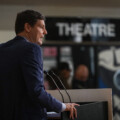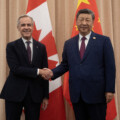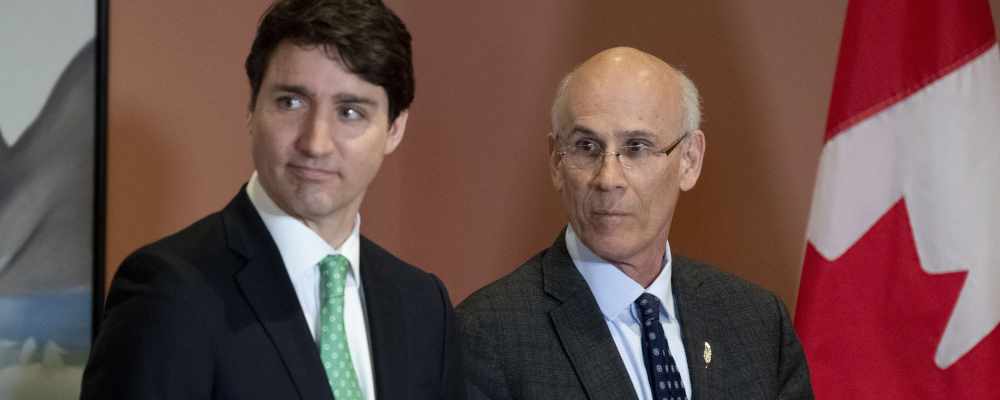The following is the latest installment of The Hub’s new series The Business of Government, hosted by award-winning journalist and best-selling author Amanda Lang about how government works and, more importantly, why it sometimes doesn’t work. In this five-part series, Lang conducts in-depth interviews with experts and former policymakers and puts it all in perspective for the average Canadian. Listen to the accompanying interview with Michael Wernick, a former clerk of the privy council, on your favourite podcast app or at The Hub.
It’s easy to bring a glass-half-empty kind of nostalgia to Canada’s public service, recalling a time when a deputy minister was afforded the greatest respect, paid like a CEO, and considered an invaluable asset to government. The notion that somehow the quality of personnel has deteriorated over time is a widely held one. But is it true?
One answer to that question is purely empirical, according to a former Clerk of the Privy Council: “In a more and more demanding environment the public sector, federal, provincial, and municipal, continues to deliver for Canadians.”
As the most senior unelected official in the land, Michael Wernick quite literally wrote the book on how government can function best. In charge of the civil service, but also the liaison to elected officials as cabinet secretary, Wernick also had a front-row seat to how politics can run roughshod over public servants. But measuring the quality of our government at the most basic level is pretty straightforward: “It’s about keeping us safe and secure, generating economic growth and prosperity,” he says. “And by a long list of measures Canada is a successful country.”
That’s not to say our civil service doesn’t occupy itself with improvement. Wernick says some of the infrastructure of government is a “vast feedback loop” designed to audit performance and do better. “There is this continuous checking in and looking back on what could have been done differently.”
But he also cautions against speaking of government as though it’s one entity. The federal government is more like 300 different organizations, with seven or eight different occupational groups, all doing different things. Like the private sector, the functions are diverse enough that they represent totally different sectors. But unlike the private sector, the management and leadership of them is made more complex because it is done in the context of politics, and also of a larger budget mandate. To analyze how government is doing, Wernick says, has to involve a look at individual organizations.
“There are pockets of excellence and innovation, and there are organizations that run into trouble.” For all the attention the trouble gets, Wernick argues there are plenty of success stories that don’t get told.
Wernick notes that public-facing services get the most attention—so you can now renew your driver’s licence online in minutes, and file your taxes entirely electronically. But internal processes of government are often the ones that get neglected—the services like finance, human resources, information management, material management, buildings, tools—“these are the kinds of things that make everything else possible. Not only do they tend to get neglected until there’s a crisis, but when you have one of these waves of spending reviews and cuts, they tend to be the things that are cut, because any group of politicians will go out and say, ‘No, no, we’re protecting service to Canadians, we’re going to find efficiencies within government.’”
One place Wernick says should not be neglected is leadership and training development, which benefits every department, but falls victim to cutbacks. It’s something he has argued for over time, including before Parliamentary Committee.
When it comes to size, Wernick is keen that the right problem be solved: even with its recent increase in size, the bureaucracy isn’t the line item that will make or break the federal budget. Of course “it’s worth trying to make the operations of government leaner, but you’re not going to balance the budget on that,” Wernick says. In fact, cutting the federal civil service in half might save you $20 billion dollars, out of a $400 billion dollar budget. “It’s worth doing because it might create better outcomes and better services and better policies. But it’s not going to be the key to fiscal balance.”
As for how departments function, Wernick says there is a balance to be struck between creating deep specialists—by leaving people in place longer—and those who have experience in multiple roles. He’s upbeat about the quality of talent the federal civil service can attract, including from the private sector. “I’m an advocate of more interchange, it’s a good idea to have people crossing from the private public and not-for-profit sectors for a period of time and learning about what it’s like on the other side,” he says. Rather than the dozen or so a year, he would like to see up to 200 interchanges, seeding more awareness on both sides of how the other functions.
It’s important not to forget that government isn’t separate or apart from the private sector, Wernick notes. “When you have a strong public sector, you get a strong private sector, and vice versa. And it’s something that Canada does better than many other countries.”
One hot political question has been the use of outside consultants in government, and Wernick takes a characteristically measured view. The pace of change in things like technology makes outside consultants necessary, and he argues that another perspective should be welcome. If there is too much reliance on consultants—and he is not saying there is—it only bolsters the argument for more robust internal training. What he calls the “learning software” of government includes developing in-house potential.

Wernick argues that the “spend money to save money” mentality is harder to achieve in the public sector. The reality is that longer-term investments in systems or staff development can more easily fall victim to day-to-day politics.
As someone who spent four decades working in various parts of government, Wernick isn’t blind to its shortcomings. “I don’t want to be misunderstood. There are lots of things to attend to.” Information management inside government is “a shambles,” he says, and there are areas of service that need to be corrected. He’s also passionate about improving training and development so that the most organizations can build on their talent.
But the evidence for how Canada’s public service functions is in the output, he says. “Things get done. This is a successful country that ranks very highly in all the governance measurements around the world.”
It’s a kind of optimism about government employees that feels refreshing. Glass-half-full, as it were. And maybe from this vantage making positive change is an easier prospect.
“I’m not making the argument that government is perfect. I’m making the argument that it learns and adapts and moves forward and the more attention paid to how it works, especially how it works internally is a very, very welcome.”
Recommended for You

‘Canadians don’t trust China’: Hub Politics on the risks and rewards of Carney’s China trip

So David Eby does want a pipeline, after all?

‘Bending the knee’: Former Canadian ambassador on Prime Minister Carney’s misguided trip to China

Disabled Canadians deserve more support from a stingy federal government




